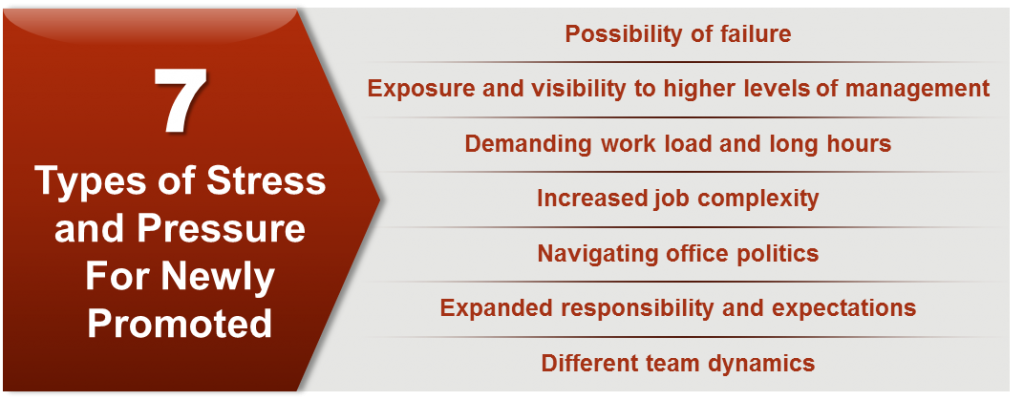Navigating the Transition at the Next Level
You can spot the winners early in their careers. Take advantage of every opportunity to support the talented employee in moving ahead. Coaching the new leadership has an enormous payoff for you, the employee and the company, particularly because giving the newly promoted needed support and guidance boosts employee retention. Motivate employees from day one of their new job with executive-level coaching that guides them to expand their influence and impact.
Promotions occur when employees are good at their jobs. They are performing at the highest level of competence and effectiveness in their current roles. However, at a certain point what they relied on – talent, skills, knowledge – will not be enough. What worked at one level may no longer be effective. They will need a new set of operating instructions, expanded capabilities, different talents and greater leadership skill to be successful at the next level. A shift in how they work will be necessary. At this point, they need a strong grasp of what executive presence is and how to begin cultivating it within themselves.
Thanks to Joel, I have become a more mature leader: self-assured and polished in how I present myself. I now have the tools to effectively manage my career and professional image.
40% of newly promoted employees fail in the first 18 months
Unfortunately, most organizations pay little attention to the newly promoted manager. This lack of support translates to a 40% failure rate in the first eighteen months.
They’ve already proven themselves as capable and confident in their prior role, so the company thinks they don’t need support in their new role. They will be just fine. And the newly promoted employee feels extra confident due to the accolades, recognition, raise and new title. Asking for and receiving support doesn’t feel necessary. So, they fly under the radar, sabotaging their chances for success. Since promotions often lead to failure, businesses need to recognize the need for promotions and employee retention strategies to work hand-in-hand.
 |
Five Ways to Set Up Promotions for Success When an employee is promoted, there is always a transition period while the employee adjusts to the new position. As a manager, there are many ways you can help a newly-promoted employee excel. Here are five steps you can take to set up your new promotions for a successful transition. |
Three Stage Promotion Model For Coaching the New Leadership
This three-stage promotion model ensures your newly promoted leaders succeed in their new management job. Throughout this 12-step process, the newly promoted receive support through every phase of the promotion process. This process is crucial to keeping your employees happy and setting them up for success.
Navigating the transition once at the next level requires a sound on-boarding plan. The three-stage promotion model will ensure that your top talent succeeds at the next level.
Help the Newly Promoted Succeed with a 6-12 Month Executive Coaching Program
Invest in your new leaders to ensure immediate success. Outside counsel and guidance from an executive coach will ease the transition into a new management job. The higher up they are in an organization, the less support a newly promoted manager receives. They are busy with new responsibilities, leading a different team, managing higher-level priorities. An expanded role can easily derail the recently promoted employee.
The Newly Promoted Challenge:
The newly promoted manager or supervisor faces many challenges in their new management job. They are experiencing a tremendous amount of pressure, both from the company and from themselves. Often, minimal support is provided to help employees navigate the new role.

The newly promoted can feel unprepared, unsupported and alone. They don’t know how to fire someone, motivate underperformers, manage former peers and lead a new team. On top of all this, most of their managers want immediate results and don’t have the patience to wait for them to grow and mature in their new roles.
For the organization and its human resource managers, these challenges can cause increased turnover, employee complaints and a disengaged newly promoted leader.
DDI study of 1,130 newly promoted managers
- 60% learn their jobs through trial and error
- 42% had no clear idea of what was expected of them, or what success in their new position would look like.
Retain Employees after the First 90 Days
Making a newly promoted employee’s introductory months successful involves more than one might think. In addition to instructing them in the tasks and responsibilities required of their new management job, leadership must provide the newly promoted with the necessary support so they can succeed in their new role. Ignoring the newly promoted is a critical mistake, one that can mar employee retention. Promotions can sometimes create a sink-or-swim situation that makes it difficult to retain employees. The first 90 days at a new management job or new role within the company is a critical window. Don’t let your employees stagnate at the top; consider bringing in an executive coach. You’ll also benefit from reading Joel’s employee retention articles, which will help you understand how to keep your star talent.
Help Your New Leaders Succeed with Active Support
Senior leadership and human resource managers must provide active support to the newly promoted leader. Without this support, the organization creates a sink or swim situation. Don’t leave their success to chance. Equip them to succeed.
These are the future leaders of the organization. Grow them. Support them.
Prioritize their development.


